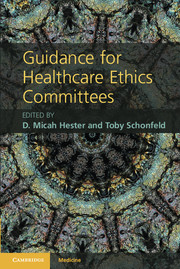Book contents
- Frontmatter
- Contents
- Contributors
- Preface
- Section 1 The Context of Healthcare Ethics Committee Work
- Section 2 Consultation
- 5 Mission, vision, goals: defining the parameters of ethics consultation
- 6 Ethics consultation process
- 7 Informed consent, shared decision-making, and the ethics committee
- 8 Decision-making capacity
- 9 Family dynamics and surrogate decision-making
- 10 Confidentiality
- 11 Advance care planning and end-of-life decision-making
- 12 Medical futility
- 13 Ethical issues in reproduction
- 14 Ethical issues in neonatology
- 15 Ethical issues in pediatrics
- Section 3 Policy Development and Organizational Issues
- Section 4 Educating Others
- Index
- References
11 - Advance care planning and end-of-life decision-making
Published online by Cambridge University Press: 05 August 2012
- Frontmatter
- Contents
- Contributors
- Preface
- Section 1 The Context of Healthcare Ethics Committee Work
- Section 2 Consultation
- 5 Mission, vision, goals: defining the parameters of ethics consultation
- 6 Ethics consultation process
- 7 Informed consent, shared decision-making, and the ethics committee
- 8 Decision-making capacity
- 9 Family dynamics and surrogate decision-making
- 10 Confidentiality
- 11 Advance care planning and end-of-life decision-making
- 12 Medical futility
- 13 Ethical issues in reproduction
- 14 Ethical issues in neonatology
- 15 Ethical issues in pediatrics
- Section 3 Policy Development and Organizational Issues
- Section 4 Educating Others
- Index
- References
Summary
Objectives
Identify key moral concepts in the care of patients near the end of life.
Describe the process of advance care planning and how it helps prevent moral conflicts over end-of-life care.
Examine the main types of advance directives and portable medical orders for end-of-life care and understand how they help guide treatment decisions.
Consider the relationship between general goals of care and speciic treatment choices near the end of life.
Identify continuing challenges in making and implementing end-of-life treatment decisions.
Case
Joan Thompson, a nurse in the cardiology unit, requests an ethics consultation regarding the care of her patient Mrs. Mary Wilson. Seventy-eight-year-old Mrs. Wilson was diagnosed with congestive heart failure 4 years ago; her condition has worsened gradually since then. She was admitted to the hospital 2 days ago with symptoms of shortness of breath, recurrent chest pain, fatigue, and confusion. This is her third hospitalization in the past 6 months. Mrs.Wilson’s difficulty in breathing has persisted despite drug therapy, and Dr. Kelly, Mrs.Wilson’s cardiologist, is preparing to intubate her and provide mechanical ventilation. Mrs. Wilson has confided to Ms. Thompson, however, that she does not want to be on a ventilator again, and wants only treatments to relieve her pain and allow her to rest. Ms. Thompson has observed that Dr. Kelly is unwilling to discuss palliative care with his patients and to write do-not-attempt-resuscitation (DNAR) orders, and she is concerned that Mrs. Wilson’s wishes are not being respected.
- Type
- Chapter
- Information
- Guidance for Healthcare Ethics Committees , pp. 80 - 87Publisher: Cambridge University PressPrint publication year: 2012

